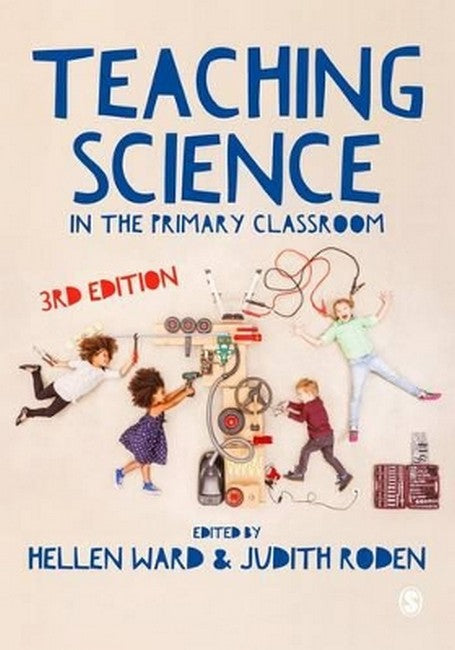Hellen Ward is actively involved in science education, working as a Principal lecturer at Canterbury Christ Church University and with teachers in a number of Local Authorities. Hellen has written several books and a number of other publications, and has developed teaching resources and teaching materials to support the teaching and learning of science. She has also contributed to science television programmes, website and teaching resources for the BBC Hellen is faculty Director for STEM at Christ Church and is also an independent education consultant. Hellen is an active member of the Association for Science Education (ASE). and a regular contributor to both national and regional conferences. She is also a member of the Association for Achievement and Improvement through Assessment (AIAA) and has published materials on assessment. Hellen is a hub leader for the Primary Science Quality Mark working with teachers across the kent and Medway region. Judith Roden is an experienced teacher of science in all phases of education. She was a Principal Lecturer working in the Faculty of Education, Canterbury Christ Church University, where she undertook the role of crossphase science team leader, managing a large team of science tutors. She has written a number of science books including the Reflective Reader in Primary Science Education, co-wrote Extending Knowledge in Practice as well a number of books, articles and chapters in respected science books. Judith now works part time for Teach First Kent and Medway.
Request Academic Copy
Please copy the ISBN for submitting review copy form
Description
1. What is Science? - Hellen Ward 2. The Skills Learners Need to Learn Science: Process Skills - Hellen Ward 3. Observation, Measurement and Classification - Judith Roden 4. Raising and Analysing Questions and Use of Secondary Sources - Judith Roden 5. Scientific Enquiry and Working Scientifically - Hellen Ward 6. Assessing Learning - Hellen Ward and Keith Remnant 7. Science from Stories - Claire Hewlett 8. Using Role-play to Stimulate and Develop Learners' Understanding of Scientific Concepts - Maria Elsham and Julie Foreman 9. Science from Games - Hellen Ward 10. Using Computers in Science - Manette Carroll and Hellen Ward 11. Science Outdoors - Andrew Berry
'This is an excellent book not only for student teachers (probably its main target audience) but for anyone involved in science lessons in the primary school. It is easy to read and gives clear practical advice including suggestions for effective classroom organisation. A real strength of the resource is that the writers have a wide range of experience in teaching science in the primary school.'- Primary Science Review 'At last a book that clearly focuses on the promotion and development of science learning from the Foundation Stage to Key Stage 2. The four authors have extensive experience in initial teacher education and in primary schooling and this is evident in the emphasis on practical examples and evidence-based guidance. Based in initial teacher education the authors have based much of the content on recent and relevant research, with a particular aim of making the scientific content lively, contemporary and fun. Initial teacher education students, teachers and science leaders-ordinators will find the book accessible, yet challenging. The examples and case studies are current and designed to help teachers make science learning active and creative. I believe that readers will welcome the assistance with planning, process skills and assessment, but more crucially will see how the range of components in the book contribute to science learning in the primary school' -" "Professor Hugh Lawlor, Director of AstraZeneca Science Teaching Trust and DfES Adviser 'This is an excellent book not only for student teachers but for anyone involved in science lessons in the primary school' - Primary Science Review 'An excellent book written with the class teacher in mind, it is practical and filled with loads of ideas. I found it an inspirational read' - Carol Stringer, Class Teacher and Science Co-ordinator, Cartwright & Kelsey Church of England Primary School, Kent ' This is an excellent book not only for student teachers (probably its main target audience) but for anyone involved in science lessons in the primary school. It is easy to read and gives clear practical advice including suggestions for effective classroom organisation. A real strength of the resource is that the writers have a wide range of experience in teaching science in the primary school.'- Primary Science Review 'At last a book that clearly focuses on the promotion and development of science learning from the Foundation Stage to Key Stage 2. The four authors have extensive experience in initial teacher education and in primary schooling and this is evident in the emphasis on practical examples and evidence-based guidance. Based in initial teacher education the authors have based much of the content on recent and relevant research, with a particular aim of making the scientific content lively, contemporary and fun. Initial teacher education students, teachers and science leaders-ordinators will find the book accessible, yet challenging. The examples and case studies are current and designed to help teachers make science learning active and creative. I believe that readers will welcome the assistance with planning, process skills and assessment, but more crucially will see how the range of components in the book contribute to science learning in the primary school' -" "Professor Hugh Lawlor, Director of AstraZeneca Science Teaching Trust and DfES Adviser 'This is an excellent book not only for student teachers but for anyone involved in science lessons in the primary school' - Primary Science Review 'An excellent book written with the class teacher in mind, it is practical and filled with loads of ideas. I found it an inspirational read' - Carol Stringer, Class Teacher and Science Co-ordinator, Cartwright & Kelsey Church of England Primary School, Kent

